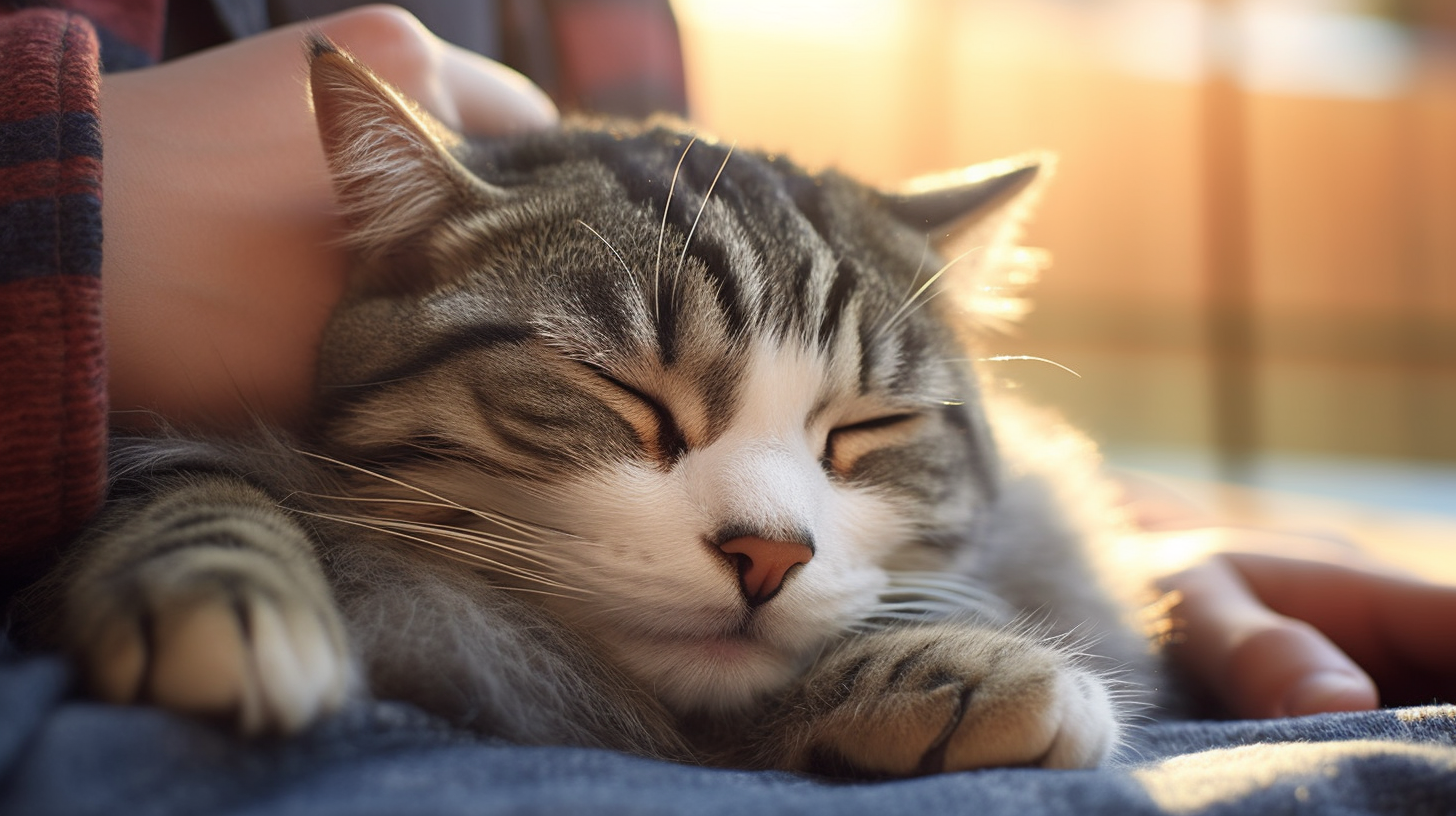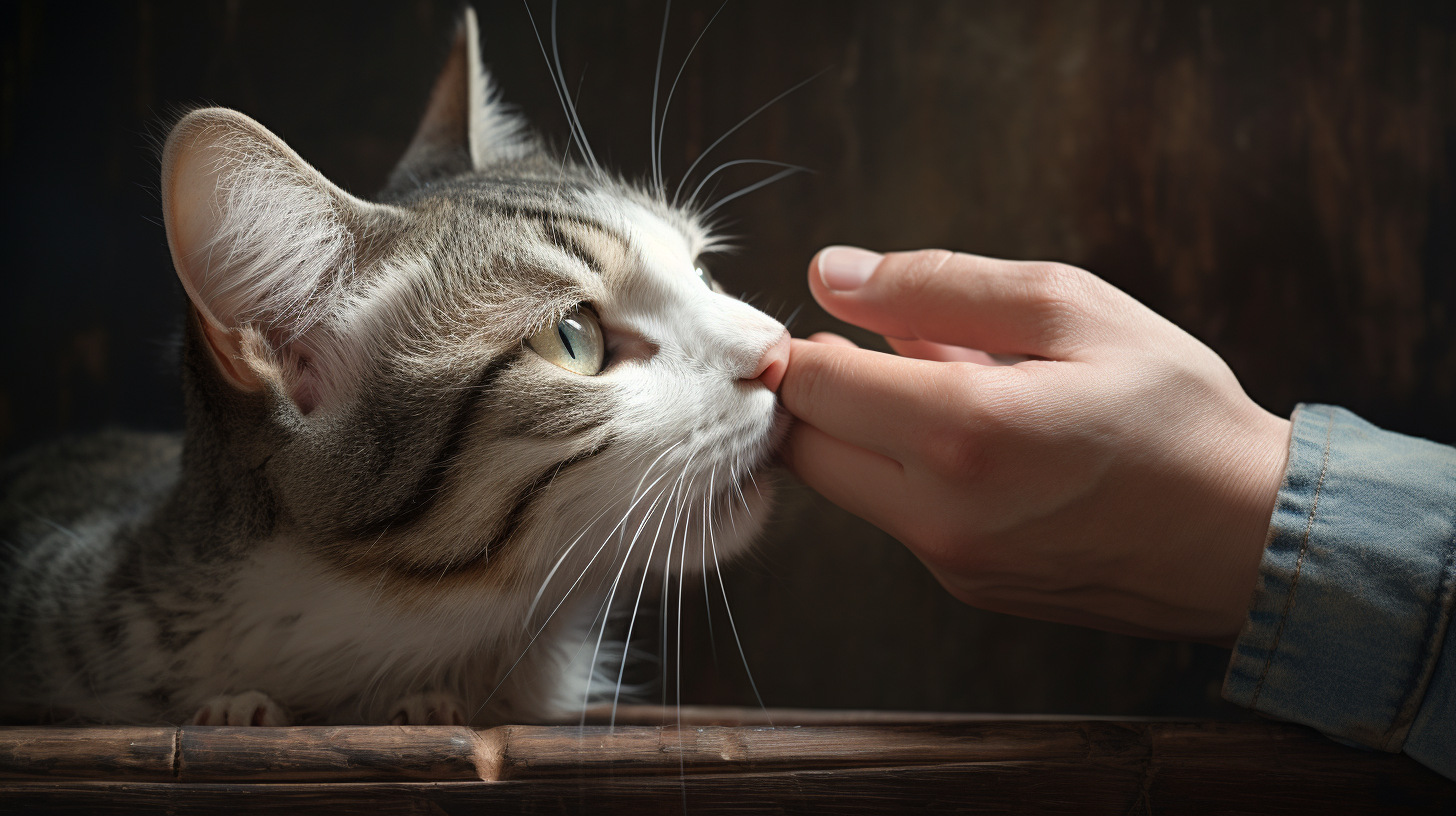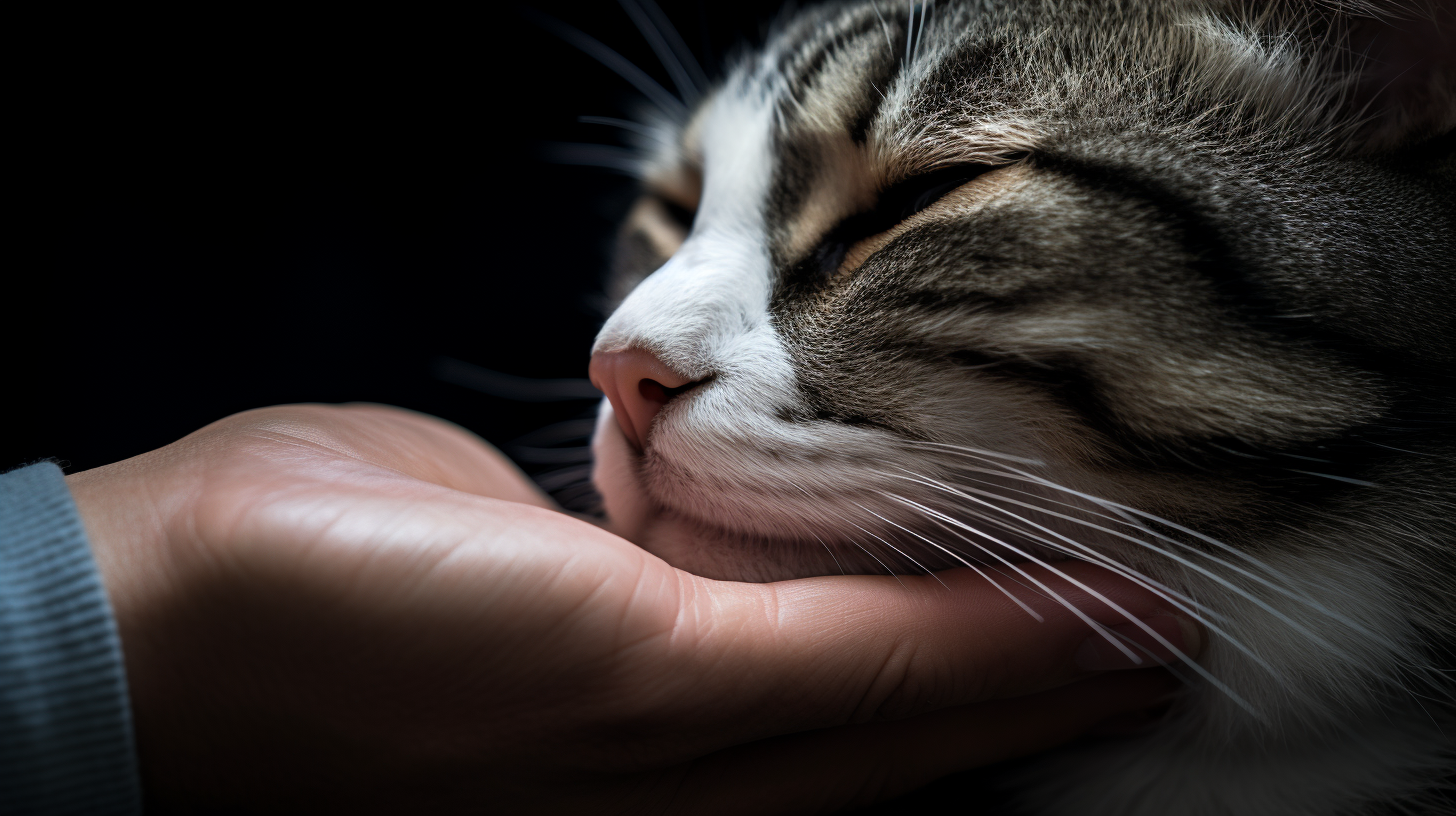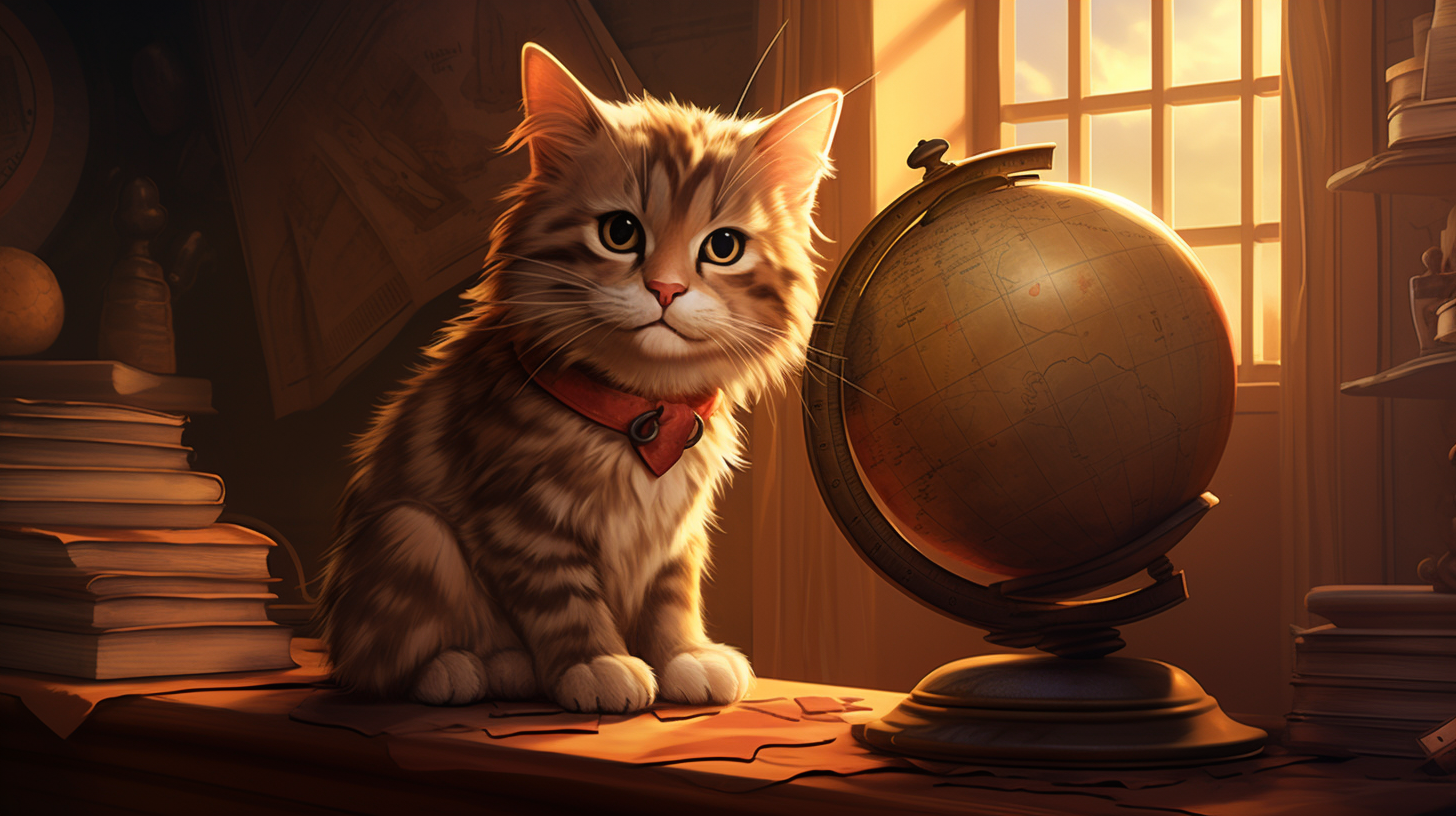Why Does My Cat Lick Me?

Do you ever wonder why your cat licks you?
It may seem strange, but there are actually several reasons behind this behavior.
When your cat licks you, it is their way of showing affection and bonding with you. It's their special way of saying, 'You're part of my social circle.' In that sense, let your cat lick you!
Cats also lick their owners out of curiosity as they explore new smells and tastes. And let's not forget, they enjoy the salty taste of human skin.
But is it safe to be licked by your cat? Generally, yes. It's perfectly safe unless you have open wounds or a weak immune system.
However, if your cat's excessive licking becomes a concern, there are ways to redirect their attention or provide other activities to keep them occupied. Excessive licking could be a sign of stress, anxiety, or even a medical issue.
So, if you notice any concerning behaviors or health issues, it's best to consult a veterinarian. Understanding why cats lick their owners helps us connect with these mysterious and lovable pets.
Key Takeaways
- Cats lick humans as a sign of affection, bonding, and social grooming.
- Cat licking can also be a way for them to mark their territory and show familiarity.
- Cats may lick humans out of curiosity and because they enjoy the taste of their skin.
- While generally safe, it is important to be cautious of potential bacteria present when being licked by a cat.
Why Cats Lick Humans

So, you're probably wondering why your furry friend loves to give you those wet kitty kisses and lick you all the time, huh? Well, let's dive into the intriguing reasons why cats lick humans!
When your cat licks you, it's not just a random act. It's a sign of trust and love. Cats are social animals, and by licking you, they're including you in their social circle. It's their way of showing that you belong with them.
Licking also has a sensory experience for cats. They have scent glands in their mouths, and licking helps them gather information about you and their surroundings. Plus, cats have fewer taste buds than humans, so a cat may lick because they might just enjoy the salty taste of your skin.
However, it's important to maintain good hygiene for your cat's tongue, as their tongues can carry bacteria. If your cat's licking becomes excessive, there are ways to manage it and redirect their attention. Understanding the meaning and purpose behind your cat's licking will strengthen the bond between you two.
Meaning and Purpose of Cat Licking

Cats lick humans to demonstrate love, mark their territory, and engage other cats for a social bond. It is quite common behavior. You can bet a cat is licking their human friend somewhere in the world right now. When your cat starts licking, don't panic! It's their unique way of showing love and acceptance. When your cat licks you, it's a behavioral trigger indicating their desire to bond with you.
You should ensure your cat does not lick you if you have an open wound. Other animals, like dogs, may show the same behavior.
This behavior also has health implications, as cats use their tongues to groom themselves and remove dirt. However, more than one cat has different licking patterns and can have different meanings. For example, licking in a specific area may be a territorial marker, while licking your hands or face could be a form of communication or a sign of trust.
If your cat's licking becomes excessive, you can discourage it by gently redirecting their attention or providing other activities to keep them occupied. You can try giving them cat toys. With a better understanding of mother cats and their licking behaviors, we can now explore how it contributes to bonding and affection.
Bonding and Affection Behind Cat Licks
To truly understand the bond between you and your feline friend, let's delve into the fascinating world of how their lovable licks contribute to your special connection.
Cat behavior is truly intriguing, and their grooming habits play a significant role in their social interaction. When your cat licks you with the cat's tongue, it's their way of including you in their social circle, showing their affection, and marking you as part of their family. Perhaps, finally accepting you as their cat parents.
Understanding reasons why your cat this behavior is crucial for a fulfilling cat ownership experience, as it helps you decode their communication and strengthens the bond you share. Your cat's licks are a testament to their love and trust in you, creating a sense of belonging and warmth.
So, let's explore further into the realm of feline love and understanding cat behavior to uncover more about their curious nature and need for exploration.
Curiosity and Exploration

Ready to uncover the fascinating world of your feline friend's curiosity and exploration? Let's dive into the intriguing behaviors of your cat and discover why they can't resist investigating new smells and tastes!
Cats are natural explorers, and they use their sense of smell to investigate scents and their taste buds to experience new flavors. From sensory exploration to satisfying curiosity, cats are constantly engaging in their environment through examining unfamiliar objects and exploring textures. They are always trying to understand their surroundings and engage in sensory stimulation. It's their way of discovering the world around them and establishing a sense of belonging outside of their usual surroundings/house.
But, as we explore their curious nature, it's essential to address the safety and concerns that come along with it.
Safety and Concerns
Get ready to explore the potential risks and precautions associated with your furry friend's curiosity and exploration! When your cat licks you, there's a possibility of bacterial contamination, especially if you have open wounds or a weak immune system. However, there are ways to ensure safety and reduce any concerns. Here are some important points to consider:
- Bacterial contamination: Keep in mind that cats use their tongues to groom, so there might be bacteria present.
- Open wounds: If you have any open wounds, it's best to avoid letting your cat lick them.
- Weak immune system: If your immune system is compromised, it's important to take extra precautions to prevent any potential infections.
To minimize excessive licking, you can try taste deterrents to make your skin less appealing to kittens, or redirect your cat's attention to other activities. However, if your cat's licking is accompanied by other unusual behaviors or health issues, it's essential to consult a veterinarian for further evaluation and guidance. Remember, your furry friend's well-being is of utmost importance.
Frequently Asked Questions
Can cats get sick from licking humans?
Cats can clean themselves effectively without licking humans. Licking serves a purpose for cats, such as marking territory and social grooming. While bacteria can be present, it's unlikely for cats to get sick from licking humans. However, humans may develop allergies or skin irritations. Excessive licking can be due to pressure or boredom, and cat owners often can redirect this behavior through training and providing alternative activities. Licking humans can also be a form of affection and inclusion in their social circle. Mutual grooming between cats and humans can strengthen the emotional bond.
Is it normal for a cat to lick a lot?
Yes, it is normal for a cat to lick a lot, but excessive grooming can be a sign of underlying issues. Grooming is a social behavior for cats, but anxiety, and health problems can trigger compulsive licking. Seek professional help and try natural remedies to soothe your cat. Excessive licking can impact your cat's coat and skin health.
Why do some cats lick more than others?
Some cats lick their fur more than others due to possible reasons such as stress, anxiety, boredom, or medical issues. To determine if your cat's licking is excessive, look for unusual behaviors and consult a vet if necessary. Promote healthy grooming habits through activities and stress reduction techniques.
How can I stop my cat from excessive licking?
To stop your cat from excessively licking, try training techniques like redirecting their attention and using deterrent sprays. Provide environmental enrichment and practice behavioral modification. If the issue persists, seek professional help to understand the underlying causes. Remember to be consistent and patient.
Should I be concerned if my cat's licking is accompanied by other unusual behaviors?
If your cat's licking is accompanied by other unusual behavior patterns, it could be a sign of possible underlying health issues. Ask yourself if your cat seems stressed. Any compulsive behavior may be a telltale sign. It's important to seek professional advice and consider environmental factors and stress. Behavioral modification techniques and providing alternative outlets for licking behavior can help. Regular vet check-ups are crucial in understanding your cat's individual needs.
Conclusion
So the next time your cat licks you, know that it's their way of showing affection and bonding with you. It could be a sign that they consider you part of their social circle and cat may want to strengthen your connection.
Cats may lick when stressed. Cats also lick out of curiosity to explore new smells and tastes.
While it's generally safe to be licked by your cat, be cautious if you have open wounds or a weak immune system. If excessive licking becomes a concern, try redirecting their attention or consult a veterinarian if there are other concerning behaviors or health issues.
Understanding why cats lick their owners can help foster a deeper understanding and connection with these mysterious pets.

